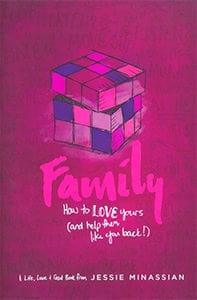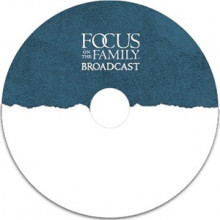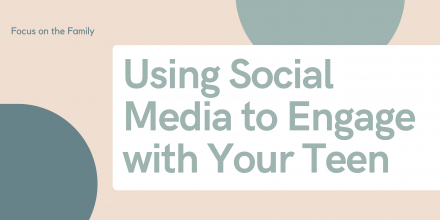Dad: Nothing like a quiet moment to myself.
Mom: Oh, that is all there is to it, Jeanette – case closed!
Dad: Hey – hey… !
Teen: Well, you haven’t heard a thing I said. You’re not being fair, Mother!
Mom: I’m not being fair?
Teen: That’s what I said!
Mom: Listen, if you’re going to scream at me, I am not going to listen to you.
Dad: Calm down. Hey, hey, hey, hey. Now, hold it. Hold it. Now, time-out, you two. Listen. Why can’t you just work this out like reasonable adults without all this yelling?
Teen: Dad!
Mom: Do you mind, Harold? Listen, Jeanette, my answer is final, and that is that!
Teen: Ugh, Mother!
John: Oh, man-
Jim: (laughs)
John: … I have been there. (laughs)
Jim: Yeah, whoa.
John: Don’t, g-, don’t insert yourself into-
Jim: Yeah.
John: … that one.
Jim: (laughs)
John: Boy, um, family relationships can be so messy and there are no perfect families. Um, I’ve had teens. We’ve had, uh, moments like that where the emotions are just bubbling up-
Jim: Are you sure?
John: … and overflowing.
Jim: Really?
John: Oh, yeah.
Jim: (laughs)
John: And, if you can relate to that, uh, rather uncomfortable scene, stay tuned. We’ve got some help for you if you’ve got a teen or preteen, or several, in the home. This is Focus on the Family. Your host is Focus President and author, Jim Daly, and I’m John Fuller.
Jim: Hey, John. We hear from so many parents who know that struggle so well, like you said. And, let’s face it, during those teen years, our kids are changing right before our eyes. And they get bigger (laughs) and it’s harder to control them, and their needs and wants change as well. Uh, they’re trying to figure out who they are as they’re growing, and they want us to kinda back off from that control that we as parents so naturally fall into.
John: Mm-hmm.
Jim: Not you though, right, John?
John: Oh…
Jim: You’ve never been a control parent.
John: In spades, as you might say.
Jim: (laughs) Uh, yeah, that process, it can be hard for us. I’m seeing Jean and I struggle with that right now, and we have those little queues for each other like, time to back off.
John: (laughs)
Jim: And, uh, just by saying it, right? Uh, but it’s so hard for teens, think about it. So much is changing for them too, their bodies, their hormones, both, uh, teen girls and teen boys. So today, we want to help you, as a parent and as a teen, better navigate these conflicts and-
John: And-
Jim: … give you some of those good tools to, uh, disagree better-
John: … Mm.
Jim: … within the context of your loving home.
John: Yeah, and we should mention that this is a program, uh, primarily for healthier families. Not perfect, as I said, but we’re talking with moms and dads who, um, aren’t dealing with, uh, a- addiction issues or-
Jim: Depression.
John: … depression, serious dysfunction. We have other broadcasts and resources for you. This program kind of a tune up for families that just wanna get a little bit better here.
Jim: Kinda Family 101.
John: Mm.
Jim: That’s the way I would say it. And, uh-
John: Yeah.
Jim: … I wanna say, if you are dealing with other, tougher issues, call us. We have counselors here that, uh, are able to assist you. Our guest today is a former guest, uh, many times actually on the program, Jessie Minassian. Jessie’s an author, speaker, blogger, and she has a passion, uh, for mentoring young women. She’s written a great book called Family: How to Love Yours (and Help Them Like You Back). (laughs) I love the title, Jessie.
Jessie: (laughs) Thank you.
Jim: Welcome back.
Jessie: Aw, it’s so good to be back with you guys.
Jim: Y- You know, even in that title, that is such a mom title.
Jessie: (laughs)
Jim: You know, if I can love them enough to where they’ll like me.
Jessie: Hm.
Jim: (laughs) I mean, that just screams mom-
Jessie: (laughs)
Jim: … to me. I mean, d- dads I think are more like, you know what? I’ll love you like I can. If you love me back, great. If not, whatever.
Jessie: (laughs)
Jim: (laughs) Is that not true?
Jessie: That- That could very well be true. The title, I mean, I was thinking from a teen girl’s perspective. I mean, we want to try to love our family well, but the truth is when we do that, then our, it’ll make it easier for our family to love us too.
Jim: Yeah.
Jessie: ‘Cause, you know, we can be a little bit hard to deal with sometimes as teens.
Jim: Well, I think that, um, for a mom, just to say love and be liked. I mean, it kinda takes-
Jessie: Mm.
Jim: … some of that tension out. You have a wonderful website too, LifeLoveandGod.com. That’s a good title.
Jessie: Thank you. Yes, uh, we’ve had for a dozen years now. It’s a place where teen girls can come and get answers to questions about anything under the sun.
Jim: That’s good, LifeLoveandGod.com. Remember that. Hey, let’s get started into the book. So, what are some of those common themes that you see in teen girls and teen boys when it comes to this topic of, how do I break away from my parents?
Jessie: Yeah. Well, it’s interesting. I would say that I would imagine that freedom would be the number one topic that we would get. But the truth is, more often we’re seeing these teens who, surprise, have brokenness in their families.
Jim: Yeah.
Jessie: And they don’t wanna repeat that for the next generation. And so they’re wondering, how do I get along with my family, first of all? But then also, how do I keep this from entering into my future family? Um, and so that was sort of the impetus for writing Family. And, um, you know, I come from a typical American family, broken in all sorts of way, (laughs) yours, mine, and ours, that’s, um… And so, it was a difficult choice to write this book at first, but then thought, well, if God can use the brokenness, I experienced in my family to help encourage these teens… ‘Cause the truth is the majority of kids are growing up with some sort of brokenness or dysfunction in their teens, right?
Jim: Well, and the truth is it’s always been that way.
Jessie: Sure.
Jim: I mean, I- I just don’t think there’s been a perfect family.
Jessie: Right.
Jim: Maybe since Adam and Eve before the fall, and they had-
John: Mm-hmm.
Jim: … they didn’t have children quite yet. (laughs) So-
Jessie: Right.
Jim: … you know, I think that would’ve taken them down anyway. (laughing)
Jessie: Absolutely.
Jim: But-
Jessie: Absolutely.
Jim: … the- the point of it is, and I love that part of your story, that brokenness. I mean, God thrives in that, and I am so grateful for the witness that you are, that you didn’t become bitter, uh, but you embrace, you know, what, you know, circumstances you’re in. And then, you change from there and you embrace God, and God uses that. But for the listeners that don’t know that let’s go back just quickly and mention what that brokenness was like for you as a little girl.
Jessie: Sure. Well, for me, my mom, um, had me out of wedlock. She had me, um, when she had moved away from her family in the Midwest and come out to California to start a life of her own, and then found that she was pregnant. And she ended up choosing to keep me which is a beautiful story in and of itself.
Jim: Mm-hmm.
Jessie: So, it was just she and I for quite some time, a single mom and this young girl. Um, and then she married my stepdad, who was a very new baby Christian, as was my mom. And there was a lot of baggage there that- that the Holy Spirit hadn’t had time to work through yet. Um, and so, uh, my stepbrothers and my younger half-sister, and I, uh, grew up in a home that was filled with a lot of anger, uh, misunderstanding, a lot of tension between my parents. Um, there were nights when, sadly, I would pray that they would get divorced-
Jim: Mm.
Jessie: … just so that there would be a little bit of peace.
Jim: Oh, wow.
Jessie: Um, I’m so thankful that they did stick it out, um, now, looking in retrospect.
Jim: Sure.
Jessie: Um, but there was a lot of confusion and hurt, and compounded on top of all of that was my belief that the entire universe revolved around me. And so, all of this dysfunction was obviously affecting me, and poor me-
Jim: That was about your teenage years?
Jessie: … Yes, yeah. (laughs)
Jim: You were a teenager then?
Jessie: As a teenager.
Jim: That’s kinda normal for a teenager. (laughs)
Jessie: It’s, uh, surprisingly very normal, right? I think we can all relate to that in some way, especially if we have teens. (laughs)
Jim: (laughing) That’s for sure. In fact, at 14, you thought about running away ’cause it was overwhelming.
Jessie: I did.
Jim: What were those emotions like? Um…
Jessie: Uh, yeah. Well I think, first of all, freshman year for any teenage girl is just wonky. It’s just hard. You’re trying to figure out-
Jim: Yeah.
Jessie: … who you are, where you belong, and then add to that family drama. And in my mind, in the universe where everything and everyone revolved around me, my dad was at the center of most of the conflict, my stepdad. Um, it seemed like he was unreasonable, that I couldn’t do anything right, that he was always angry, and I was just done. And so, I decided I was gonna run away, at least I thought I would. And so, I started stuffing my backpack with various sundry items, like the $10 dollars I had, ’cause that was gonna help.
Jim: (laughs) That’ll go a long way.
Jessie: Right? And, um, my getaway vehicle was a pair of roller blades that older brother had given me.
Jim: (laughing)
Jessie: And so, as I’m thinking about this and I’m thinking, “Okay, I’m gonna like, go out my window, I’m gonna carry my roller blades down the street,” and then I realize that because my brother had been into trick roller blading, there weren’t any brakes on these roller blades.
Jim: You don’t need brakes when you’re trick rolling.
Jessie: You don’t, you’re not supposed to have them. They get in the way. So, (laughs) I was a very new rollerblader, not great.
Jim: (laughing)
Jessie: And I looked out my window, and I lived in the mountains, and it was steep downhill both to right and left. And, I just had this vision of myself careening down my street and crashing in a tumbled mess at the bottom. And that was the end of my runaway plan.
Jim: (laughs)
John: Mm.
Jessie: It was, that was it, I was not brave enough to-
Jim: It was just a thought.
Jessie: … to take it. But, uh, I think it was though the start of, not perfectly, but deciding if I’m gonna stay, I might as well stay well and make the most of what I can in this family. And it was the beginning of a long process of sort of getting outside of myself and seeing my family around me.
John: Mm.
Jim: Well now, y-, it sounds like you found that pretty much on your own. How does a parent, speaking to parents right now…? I mean, we’re all leaning in going, “Yeah, I’ve got a teenager,”-
Jessie: Mm-hmm.
Jim: … “Help me.” How does a parent help broaden that perspective?
Jessie: Oh gosh, Jim.
Jim: I mean, it was your roller blade hill experience, but- (laughs)
Jessie: Yeah, yeah.
Jim: … what does a parent do?
Jessie: It was that, but it was also the work of the Holy Spirit. As I leaned into God and started to see who he was, it changed who I saw myself as and started to look at others the way that God wants us to.
Jim: You know, that’s a really interesting point because we want to learn… I mean, people are listening right now, I think, because we wanna be better parents, et cetera.
Jessie: Yeah.
Jim: Sometimes it’s not for you to do-
Jessie: Absolutely.
Jim: … and that’s a hard lesson too.
Jessie: Oh gosh, yes. (laughing) I’ve joked that I wrote this book, Family, for my kids so they would appreciate me more. (laughs)
Jim: (laughs)
John: (laughing)
Jessie: But they… Uh, it really is a work of the Holy Spirit. It’s for them and it’s for us. And for us, we’ve had hopefully more years at this than they have. And as parents, it sort of cracks open our selfishness and allows us to see that there are others that we have to care for. But they haven’t had that experience yet.
Jim: I would say one thing, uh, as we’ve talked to so many great experts here at the ministry, i- i- is to broaden their experience-
Jessie: Yes.
Jim: … by volunteering and doing some things-
Jessie: Yeah.
Jim: … outside of the home. I think that makes for a more generous heart as a teenager-
Jessie: Yeah.
Jim: … that they can see poor people or, you know, take them to a soup kitchen and help them in that way. I think those-
Jessie: Yeah.
Jim: … experiences can help.
Jessie: Absolutely. And that was the-
Jim: But (laughs) it’s not foolproof.
Jessie: … point I was gonna make is if- if we can’t do the changing, do everything you can as a parent to put them situations-
Jim: Right.
Jessie: … where God can do his thing.
Jim: Put them in an environment where they can see it at least.
Jessie: Yes.
Jim: And, uh, at, I think that’s one of the best things you can do. Family secret was another aspect of the book that-
Jessie: Mm.
Jim: … caught my attention. Uh, describe what your family secret… Uh, we’re all think-
Jessie: The fam-, the family secret, it’s gonna be (laughs)-
Jim: … okay, what is the family secret?
Jessie: … very scandalous.
Jim: (laughing) Right. What was it?
Jessie: Uh, the secret I discovered was much less glamorous, but much more life changing.
Jim: Yeah.
Jessie: As I was looking through, you know, a verse that we all know and love, Romans 8:28-
Jim: Love it.
Jessie: … that God works all things together for the good of those who love him. Um, the very next verse starts out with the word, “for,” which we know to be a causal conjunction. That means that we better pay attention to what came before because this is the reason behind it.
Jim: Hold it, John, did you know, “for,” was a causal conjunction?
Jessie: (laughs)
Jim: (laughs)
John: Uh, I wasn’t gonna mention that I knew that-
Jim: I may have been asleep in sixth grade on that one.
John: … but yeah.
Jim: (laughing)
John: (laughing)
Jim: Anyway, back to the causal conjunction-
Jessie: So, right. So, the causal conjunction-
Jim: … You lost me.
Jessie: … “For,” the whole reason that God can work everything together for good is because God knew his people in advance, so there’s that fore knowledge. And I would add, and he knew the family he was gonna stick you in.
Jim: Huh.
Jessie: And he chose them, he chose us to become like his son.
Jim: Yeah.
Jessie: The whole point of God working everything together for good is that we would become more like Jesus Christ. And the secret I found is that God stuck us in our broken, cracked families on purpose because what better training grounds to practice Christlike selflessness and patience, and unconditional love. And all those things that are really easy to do when you have like, casual relationships with people-
Jim: Yeah.
Jessie: … but you stick people under one roof-
Jim: (laughing)
Jessie: … where you’re not at your best and people rub you the wrong way, and it’s really hard to grow in Christ’s likeness. I- I truly believe, for the brief window that I was not living with my first family or starting my second family, I was really holy. I was really holy. I-
Jim: (laughs) When you were living alone.
Jessie: … Right. Exactly.
Jim: (laughing)
Jessie: When I didn’t have a family to live with, I didn’t have an anger issue, I was pretty much sinless. It was great.
John: (laughs)
Jim: You didn’t have dirty dishes either, probably. (laughs)
Jessie: A- And the house was always clean, right? Um, but now, yeah, I’m just coming to realize-
Jim: Mm.
Jessie: … the secret reason that God has us in families is to become more like Christ.
Jim: But it is that selflessness, you know, the whole thing, marriage and even parenting, and-
Jessie: Mm-hmm.
Jim: … existing in this world is about becoming more like Christ, becoming more selfless. And it really rubs the- the flesh the wrong direction-
Jessie: Mm, mm-hmm.
Jim: … That’s not who we wanna be.
Jessie: Mm-hmm.
Jim: Hey, uh, another thing, and this is so common, uh, is the attitude issue in teens-
Jessie: (laughs)
Jim: … And you’re working with a lot of teen girls-
Jessie: Yes.
Jim: … but let me tell you, there’s attitude in teen boys too. Let, you know-
Jessie: (laughing)
Jim: … So, the- the question there… A lot of parents that I talk to, one, they’ll be shocked that others are experiencing this. (laughs)
Jessie: (laughs)
Jim: You know, “If you look at the Smith’s, oh, their teen son, their teen daughter… He’s so well-behaved, he’s so good,”-
Jessie: “So respectful.”
Jim: … “How come, how come our kids aren’t like those kids?”
Jessie: Yeah.
Jim: You- You know the discussion that goes on.
Jessie: Mm-hmm.
Jim: So, a- address that issue of attitude. It exists. What is a teenager going through and what is a parent going through?
Jessie: Mm.
Jim: Speak to both camps.
Jessie: Okay. Well for teens, I- I was just speaking recently at a residential center for teens who have had so much trouble at home or, you know, in life-
Jim: Mm.
Jessie: … that they’re, that they need a time out, basically, away from their family. And afterwards a girl came up to me and said, you know, “Jessie, did you ever like, with your mom, really want to be nice but just feel like this selfish, grumpy diva took over your body? And like, the things coming out of your mouth just weren’t what you wanted?” Like, “Oh, yeah.”
Jim: Wow, that is good.
Jessie: Yeah. (laughs) Yes.
Jim: Mm.
Jessie: There’s something about the teenage years, this crazy con-, cocktail of hormones and craving independence, and becoming your own person, but still wanting to be a part of a family, that make for some really volatile emotions. And there’s no one easy step to fix that. I think even girls who love God, even guys who love God, sometimes have a really hard time being respectful at home. And r-, truly, I mean, the eye roll really is a very effective tool to communicate a whole host of emotions-
Jim: Mm-hmm.
Jessie: … right?
Jim: (laughing)
Jessie: From like, “I think your clothes are lame,” to, “You’re so unfair.” Everything can be communicated (laughs) with an eye roll. Um, but that- that act, I think, goes back to our heart. That eye roll is so indicative of that heart emotion of rebellion or pride, or whatever it is-
Jim: Yeah.
Jessie: … that they’re wrestling with. So, it really does go back, again, to the Holy Spirit doing that transformative work in their hearts. And then us as parents, modeling-
Jim: Right.
Jessie: … what it looks like to control our emotions and to not cop attitude with our kids. I don’t know if you guys are guilty of this (laughs). But-
Jim: No, no, not at all. (laughs)
Jessie: … man.
John: You could just keep self-confessing, that’s fine.
Jessie: (laughing)
Jim: Yeah, I, this is making us feel a lot better. (laughs)
John: (laughs)
Jim: But it’s true.
Jessie: Man, sometimes I catch my daughter giving me the same attitude that I’m giving her and it’s really ugly, and embarrassing. But- But I’ve gotta model that for her of what it looks like to show honor-
Jim: Yeah.
Jessie: … to her, to them, to both of my daughters, even when I’m irritated with them.
Jim: It’s so hard and that’s the trigger point where we get pushed, you know, that button in us gets pushed, and we get right down in the, in the gutter with them. (laughs) And-
Jessie: Yes.
Jim: … you know, and I’ll, uh, always think to myself, “I am the adult in this conversation.”
Jessie: (laughs) Right?
John: (laughs)
Jim: It’s kind of an embarrassing moment when you come to that-
John: Yeah.
Jim: … realization. What- What- What am I doing down here with this guy?
Jessie: It’s so true.
Jim: Um, y- you mention, and you don’t hear a lot about this, but the fifth commandment. So, I’ll ask the listeners.
John: Mm.
Jim: Okay, everybody. What’s the fifth commandment? You’re going through them. Okay, murder. That’s the one, honor your mother and father, right?
Jessie: Mm-hmm. Yeah.
Jim: But we don’t talk about that one much and when you bring it up… Now, just a little test of three, have- have any of you brought that up with your kids?
John: Oh, I quote that one all the time.
Jim: (laughing)
Jessie: (laughing)
Jim: And how’s that go down?
John: … Yeah, not so well.
Jim: (laughs)
Jessie: “But don’t you want a long life on the earth?” And she says, “Not if it’s with you.”
John: Ooh. Ugh.
Jessie: (laughing)
Jim: Yeah, yeah. It’s like, one of those brutal tools we pull out. “Do you know the Bible says to honor your father? You’re not honoring me right now.”
Jessie: That’s exactly right.
Jim: And they look at you like, ’cause you don’t deserve it.
Jessie: (laughs)
Jim: (laughs)
John: Ooh.
Jim: But, what- what is the importance of that? We’re- We’re-
Jessie: Yes.
Jim: … laughing with that, but there is something, God is trying to say something to us-
Jessie: Absolutely.
Jim: … in honor your mother and father.
Jessie: And it was shocking to me, as I was looking at that fifth commandment, the first four are teaching us how to honor God himself. And then right after that, the first relational commandment is honor your father and mother. It wasn’t don’t murder, it wasn’t don’t covet, all those kinda biggies that I feel like went along with the lightning and thunder that was going on.
Jim: Right.
Jessie: But-
Jim: Deserve the big-
Jessie: … Right, like, bah.
Jim: … response.
Jessie: But it was honor your father and mother. And I, the more I mulled on that, the more I thought, “Man, if it’s true that family is the best place for us to learn how to honor and obey people when they don’t deserve it, when their rules are unfair, when they don’t get everything right, isn’t that the perfect training ground to honor God himself?” Because we don’t always understand his methods, we don’t always like his discipline, we don’t always understand where he’s going with things. And so, I think he gave us that commandment, honor your father and mother, because that’s how we learn to honor God himself.
Jim: Mm, that is so true.
John: Our guest on Focus on the Family is Jessie Minassian. Uh, we’re talking about her book, Family: How to Love Yours (and Help Them Like You Back). And, uh-
Jim: (laughing)
John: … we’ve got that and a CD or download and our mobile app as well at focusonthefamily.com/broadcast or call us and order the book. The number is 800, the letter A, and the word FAMILY. Okay, so how do we do this one, Jessie? I mean, how do we help our children see that this is a step toward honoring God, but it starts with me.
Jessie: I think maybe the best way for us to start with us as parents. Because the honor your father and mother is the first step in learning to honor God, but we’re always under submission, right? I mean, thinking about our relationship with our spouse or our boss, or the government, all these situations that God places us in where we still have to learn to honor- and sometimes obey people or institutions when we don’t agree with their methods or their discipline, or their reasoning. Um, for us to show… And then make that verbal connection with our teens. Like, I’m asking you to honor me because I know that God’s gonna bless you, even if I don’t get everything right, because I’m not gonna get everything right. God will bless you for choosing to honor and obey your authority figure, just like I am doing X, Y, and Z-
Jim: Mm.
Jessie: … to honor God through the relationships that he’s put me in.
Jim: Um, you also talk in the book about trust, complete trust and limited freedom (laughs)-
Jessie: Mm.
Jim: … I think is the core. I love that. It’s a struggle though for teens and parents, uh, to learn that trust and that freedom balance.
Jessie: Mm-hmm.
Jim: And usually the teens would say, “Yeah, your freedom metric is way out of balance, Dad or Mom.”
Jessie: (laughs)
Jim: And “You don’t trust me enough,” and, “What have I done to break the trust, I’m a,”-
Jessie: Yes.
Jim: … “I’m generally really a good person.” I mean, you can hear those conversations.
Jessie: Yes.
Jim: So how do parents and teens navigate that trust idea with limited freedom or more freedom?
Jessie: Yeah, this was a huge thing for to learn to recognize ’cause what I was, what I was hearing from a lot of girls, they were saying, “My parents say they trust me, but they won’t let me do anything.” And so-
Jim: (laughs) Anything. Nothing.
Jessie: … there’s… Nothing. Nothing at all.
Jim: (laughing)
Jessie: Nothing. Everything’s pretty dramatic-
Jim: I love that.
Jessie: … when you’re a teen.
John: (laughing)
Jessie: But what- what I was finding is, man, it- it’s possible, and there’s several relationships in our lives, not just from a teen to their parent, where we have absolute or complete trust from someone else, but we don’t have complete freedom, there’s limited freedom. And one example is in the marriage relationship. I trust my husband completely. He trusts me completely. We have a foundation of trust in our marriage that’s been built over 15 years. We still have limited our freedom on purpose-
Jim: Mm.
Jessie: … for one another. We have each other’s passwords for everything. We check with each other if we’re gonna be alone with a member of the opposite sex. We, um, always consult each other if we’re gonna make plans that effect the other person. We limit our own freedom and the freedom of the other person in the name of trust. And I think that’s a key for parents and their kids to understand is that I can completely trust my daughters, but that doesn’t mean that that comes with unlimited freedom.
Jim: Yeah, I love analogy.
Jessie: I necessarily have to limit their freedom to help them maintain that trust.
Jim: Yeah. And some of that, I mean it, being that caution zone-
Jessie: Mm-hmm.
Jim: … right? The precautionary measures you’d wanna take in a marriage, in parenting, as a teen-
Jessie: Realizing-
Jim: … to protect you.
Jessie: … It’s- It’s humility, right?
Jim: Right.
Jessie: It’s realizing, “I am vulnerable. I am not invincible. And so I need someone else to help me maintain those boundaries.” Now, if a teen can get to that point, it’s money.
Jim: Yeah.
Jessie: Probably hard to do-
Jim: Yeah.
Jessie: … for a teen, but if, as parents, if we can explain that difference. And, again, bring up in conversation the places where you have limited your freedom, whether it’s your relationship with the Lord or with a spouse-
Jim: Mm.
Jessie: … or a boss, to show them that it doesn’t mean that you can’t still have a great time.
Jim: Jessie, in previous broadcasts we did talk about your crushaholic problem. (laughs)
Jessie: Yes. (laughs)
Jim: I lo-, I love that. And-
Jessie: All my secrets are exposed.
Jim: … those teen years are so, can be so full of that, you know-
John: Mm-hmm.
Jessie: Mm-hmm.
Jim: … you go from crush to crush, to crush, and-
Jessie: Mm-hmm.
Jim: … this guy talked to me, or this girl talked to me-
John: Yeah.
Jim: … and I don’t know what to do. And, you know, those things happen. It’s a normal part of the teen experience. So I want you to talk about that crushaholic-ism-
Jessie: Yeah.
Jim: … and- and how you, uh, got over that, or how you discerned it over- over those years, and what advice you might have, for parents and for teens?
Jessie: Yeah. For parents… It definitely is part of the teen years, and I don’t think-
Jim: (laughs)
Jessie: … even when we, even when we talk about it with our teens and they have a healthy view of the difference between admiration and attraction, and all those things that we’ve talked about on previous broadcasts. I think playing into this idea of limited freedom, this is a perfect example of where parents do need to step in and limit their kid’s freedom, even though they do trust them explicitly. And a perfect example of this, my dad (laughs) was a little bit strict in what we were allowed to do, um, and there was this dance in my small town. And I was just-
Jim: (laughs) Uh-oh.
Jessie: … over the moon. I was so excited because word was that… We’ll call him Dreamy Boy.
Jim: (laughing)
John: (laughs)
Jessie: Dreamy Boy was (laughs) going to be-
Jim: Just to pick a name.
Jessie: … Just to pick a name, we’ll call him DB for short.
Jim: (laughs)
Jessie: So, he was gonna be at the dance and I heard that he wanted me to be there, and I was over the moon. I mean, this was like, gonna be the teen movie spectacular moment-
Jim: Yeah.
Jessie: … that my young heart had been craving. And I was all ready to go and before the dance, my dad said, “You can’t go.” And I was devastated. I was pretty sure my entire social life was dead from that point on, and I tried every, you know, phrase in the book. “But why?” And he’s just like, “No,” like, “You can’t go.”
Jim: “You’re crushing me.”
Jessie: Right? But what I didn’t realize then and what I learned later was, you know, Dreamy Boy wasn’t exactly as dreamy as I had previously thought. And even if I had had that teen movie spectacular moment, my dad protected me from probably a whole summer of regret.
Jim: Huh.
Jessie: He did not have the greatest reputation and I was young, and vulnerable, and really craving attention.
Jim: Mm.
Jessie: And that probably would not have ended well. And my dad didn’t even realize it at the time. He didn’t know why I wanted to go so bad, but he trusted his intuition and it saved me. He limited my freedom and it ended up freeing me.
Jim: Even with the hassle that it incurred-
Jessie: Oh, it totally did.
Jim: … you know that you were-
Jessie: That eye roll and the door slam-
Jim: … I’m sure… Yeah.
Jessie: … and all those things that went on. But later I was able to thank him, as an adult, not later like that week.
Jim: Well, and sometimes-… I mean, sometimes… We’ve talked about how to reduce friction and all that. Sometimes there’s just gonna be friction-
Jessie: Yeah.
Jim: … and you need to accept it-
Jessie: Yeah.
Jim: … especially in that parenting role where you- you just know the right thing to do and you gotta do it.
Jessie: Yeah.
Jim: Uh, Jessie, you’ve mentioned a few times and you’ve interwoven dad and stepdad-
Jessie: Mm-hmm.
Jim: … and I know you’re speaking of the same man.
Jessie: Yeah.
Jim: Speak to that issue of having a father who’s not your biological father, he’s your stepdad. And it’s nice that you refer to him as father and dad-
Jessie: Mm-hmm.
Jim: … I think that’s a good thing. Uh, but that was one of your biggest struggles is your-
Jessie: Yeah.
Jim: … relationship with this man who came into your life a little later. I don’t know what age you were.
Jessie: I was five when they got married.
Jim: So, five when he married your mom.
Jessie: Mm-hmm.
Jim: Um, speak to his leadership and that struggle that you did have-
Jessie: Mm-hmm.
Jim: … was it worse than you thought it would be? Did it have good moments and bad moments?
Jessie: Yeah.
Jim: What did it look like?
Jessie: Yeah. My stepdad, who I’ve always called dad and I’ve never called him anything else until having to differentiate for the purpose of-
Jim: Sure.
Jessie: … of this book. Um, it- it was a really rough growing up. But you know what? As- As an adult, now looking back on it, something that has struck me so profoundly… Because remember, as I’m a kid and a teenager the world revolves around me, and so everyone must love me unconditionally. Like-
Jim: (laughs)
Jessie: … that’s just sort of a given. Who wouldn’t love me?
Jim: That’s right.
Jessie: But as an adult looking back on it, now I can see, wow, he chose to take me on.
Jim: Mm.
Jessie: He said that I was a cute but precocious little five-year-old-
John: (laughing)
Jessie: … who needed a lot of discipline, and, uh, he’s probably right about that.
Jim: Yeah.
Jessie: And even though I didn’t agree with his discipline methods or the anger that he had learned from multiple generations of abuse that, um, that he was trying-
Jim: Yeah.
Jessie: … and he chose to love me. He went to all of my sporting games. He let me wear his favorite sweatshirt-
Jim: (laughs)
Jessie: … like, every time it came out of the wash. And he told me he was proud of me.
Jim: Wow.
Jessie: And those things now as an adult looking at, I- I’m just so grateful that he would do that. And I did as a kid, I wondered would things have been different if my mom had married my biological father, if I even knew who he was. Or, um, you know, how- how things would change, but looking back on it now, I- I see that God, that secret that he had of wanting to make me more like Christ, that was the perfect family-
Jim: Mm.
Jessie: … to do that in.
Jim: That is beautiful and what a great place to land today. I do wanna come back next time and pick up the conversation, and-
John: Mm-hmm.
Jim: … talk more about teens and their parents, and how to (laughs) manage these years more constructively. Not perfectly, most likely, but more constructively. This is great stuff, Jessie-
Jessie: Mm.
Jim: … and I’m eating it up. Your book, Family: How to Love Yours (and Help Them Like You Back), um, thank you for that encouragement. And, especially, you know, I know you’ve written this to teen daughters to help them and to help their parents, uh, better understand. But it does apply to boys as well, I’m getting a lot out of this too-
John: Mm-hmm.
Jessie: Absolutely.
Jim: … If you have a child who is growing up in your home (laughs) and they happen to be a teenager, uh, I wanna get a copy of this book into your hands. So write us here, if you can’t afford it, we’ll get it to you, just contact us. And, if you can give us a gift for any amount, we’ll say thank you by, uh, sending the book along to you.
John: Yeah, you can donate and get a copy of Jessie’s book when you call us. Our number is 800, the letter A, and the word FAMILY or stop by focusonthefamily.com/broadcast. And be sure to check out Brio Magazine. It’s a magazine for teen girls and it can be really helpful, uh, as you guide your daughter through the culture and relationships around her. Details about Brio Magazine at our website. On behalf of Jim Daly and the entire team, thanks for joining us today for Focus on the Family. I’m John Fuller inviting you back as we continue the conversation with Jessie Minassian, and once again, help you and your family thrive in Christ.























